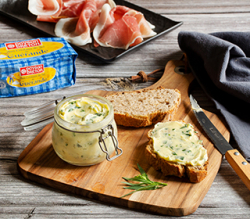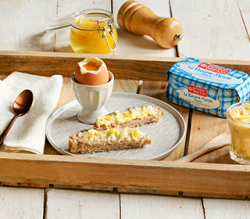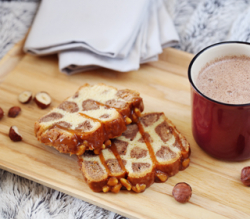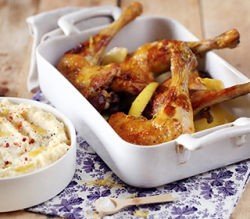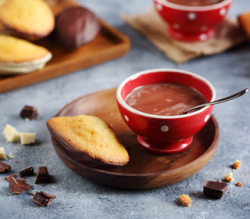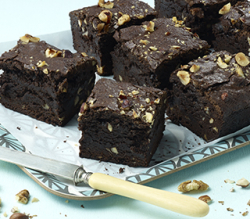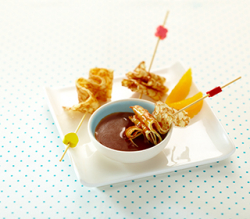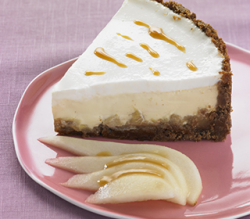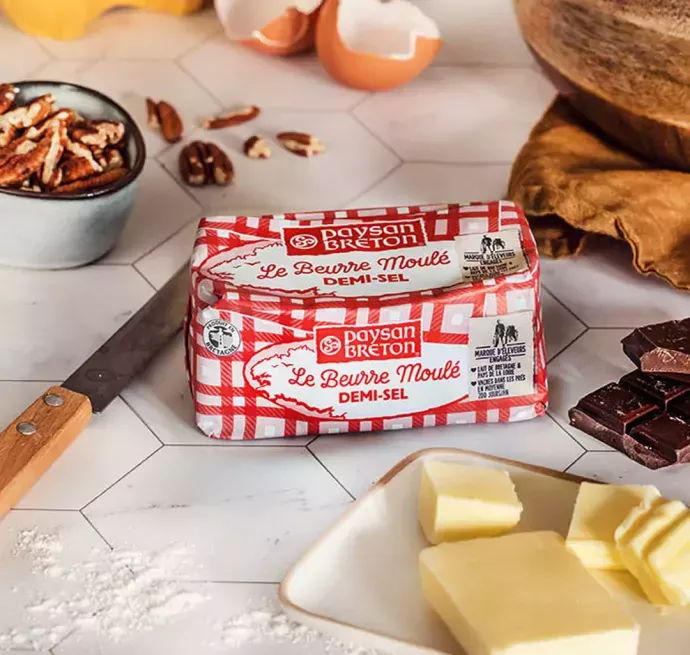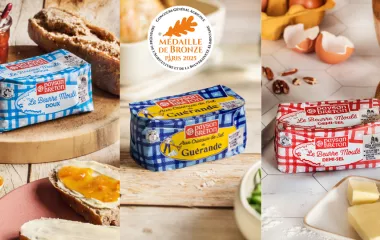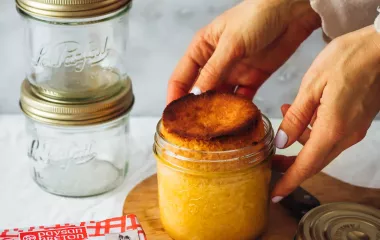Our articles
Butter, an everyday staple
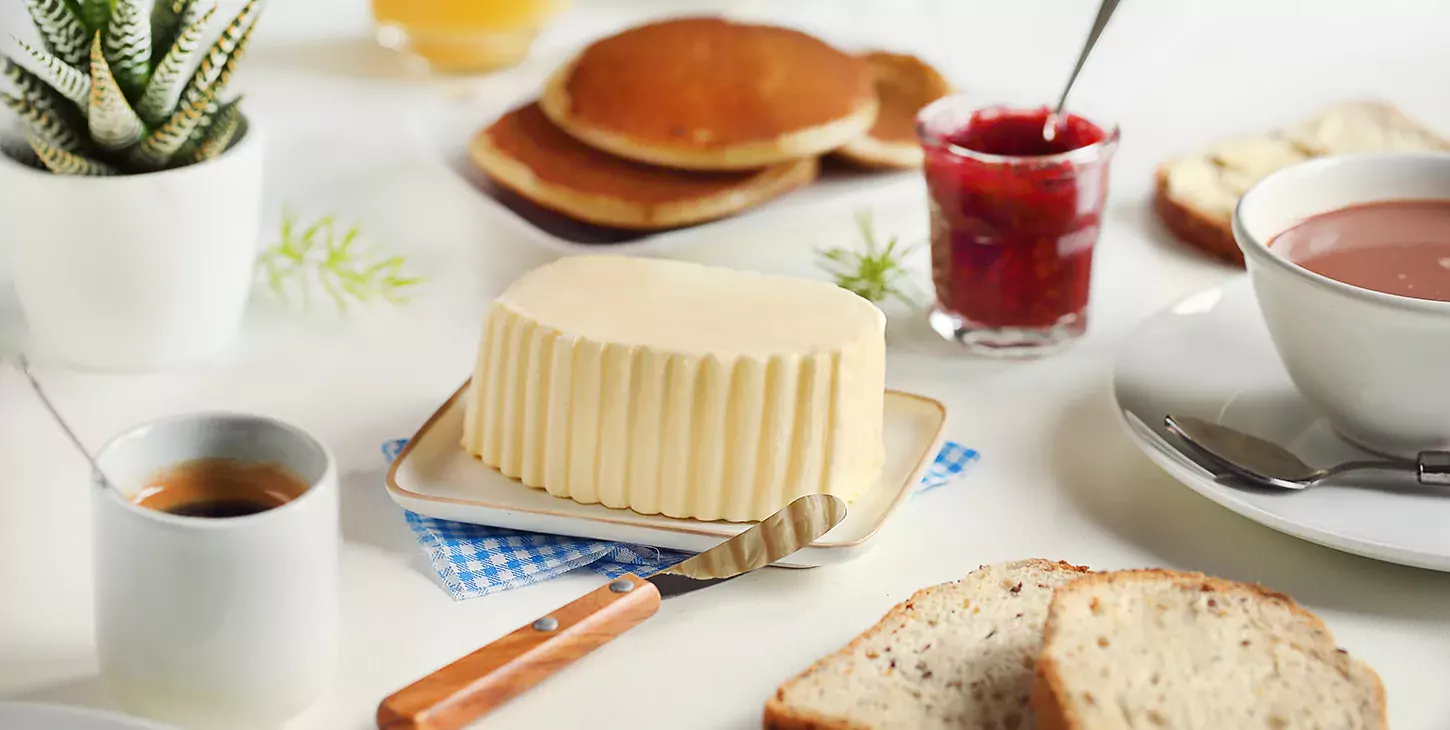
Butter is an everyday staple that is indispensable in French cooking. In France, we are the world’s largest consumers of butter, getting through 8kg per year per person. With so much quality in a single product, it’s no surprise – there is nothing more versatile, tasty or natural than our butter!
Spread on some bread, used in baking, for cooking meat or to add a touch of deliciousness to your purées, butter is often the first port of call. But how well do you know this ingredient? Find out 10 things you may not know about butter.
1. Butter is a natural product - TRUE
To make good butter you need good milk. The fat – i.e. the cream – is extracted and churned with lactic ferments to produce butter. Depending on the recipe, a pinch of salt can be added. And that’s it! We carefully select the ferments to give our butter its characteristic taste. It is simple to produce and requires nothing but a handful of natural ingredients. By law, no additives can be added to butter. At Paysan Breton, we love tradition and this is why the recipe for our slightly salted butter hasn't changed in 50 years.
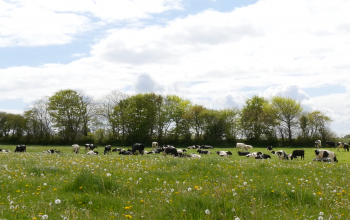 2. The colour of butter varies from season to season - TRUE
2. The colour of butter varies from season to season - TRUE
Butter is generally slightly more yellowy in spring and summer and paler in winter. Why? Because of the cows' diet. On average, our farmers put their cows out to graze 200 days a year, usually from March to November. In winter, they are kept sheltered from cold and windy weather in well-ventilated cowsheds. In spring and summer, they are to be found in the meadows, gorging on green grass and wildflowers. Because grass has more pigments in spring (carotene for example), this has an impact on the milk and hence on the colour of the butter, which is more yellow during this season. And there's plenty of green grass in Brittany and Pays de la Loire!
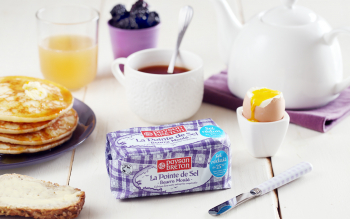 3. Butter is bad for your health - FALSE
3. Butter is bad for your health - FALSE
With food in general and with fat in particular, the best thing is to vary your diet. Because each fatty acid has a nutritional benefit, butter and oil complement each other. Butter’s main advantage is that it is rich in vitamin A and D. It is also the only fat that naturally contains vitamin A, a vitamin that plays an important role in eyesight, growth, skin vitality and resistance to infection. Vitamin D improves the absorption and fixation of calcium in our bones. Butter is also a source of vitamin E, an antioxidant that strengthens the immune system. Butter is a fat and therefore too much of it can is not healthy but why deprive yourself of all these advantages?
4. Butter does not need to be stored in the fridge - FALSE
The best way to preserve butter is to keep it at between 4 and 8°C, away from air and light. Storing butter in a cupboard is not a good idea because this can affect the taste. If you prefer to remove it from its wrapper, we advise that you keep it in an airtight butter dish away from light because otherwise it may become oxidised more quickly. We also recommend that you keep it in the fridge.
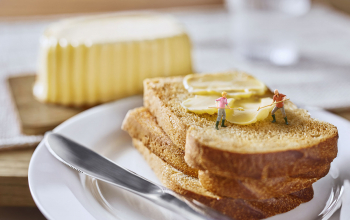 5. Butter is great in cooking… but it has many other uses – TRUE
5. Butter is great in cooking… but it has many other uses – TRUE
Spread on some toast for breakfast, used on vegetables or pasta for lunch, to flavour your meat or fish when cooking, it’s also delicious when used in chocolate cakes. Butter is super versatile and a mainstay in our recipes. Butter enhances the taste of food and improves the texture of sauces, cakes and pastries. Its many uses make it a highly practical product to have in your fridge and there’s never any waste because it can be used in so many ways. But did you know it has many other uses? To stop water from boiling over during cooking, add a knob of butter to the boiling water. This will stop foam from forming, which prevents water from boiling over. Butter in the bathroom? In India, clarified butter is often used in Ayurvedic medicine. Recognised for its hydrating qualities, it is applied to skin and hair. Now there’s a wholly natural tip!
6. Butter has the most calories of all fats - FALSE
Butter is a fat so it contains calories. But it doesn’t have any more calories than margarine and has less than oil. You may not know this, but the fat content of unsalted butter is 82%, exactly the same as margarine. The difference is, margarine is manufactured from vegetable oil and so can contain various additives. Butter is better for you than margarine because it’s a natural product. What about oil? Oil is 100% fat and therefore has more calories than butter.
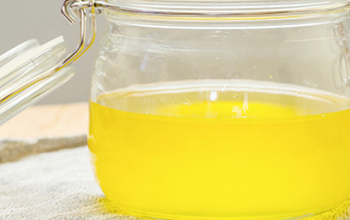 7. Clarified butter lasts longer - TRUE
7. Clarified butter lasts longer - TRUE
Used by top restaurant chefs, clarified butter lasts longer, particularly at ambient temperature. The other advantage of clarified butter is that it doesn’t brown during cooking. Fancy a go? It’s easy! Just heat some butter on a very low heat and when you see a white foam form on the surface, remove it with a teaspoon. This is protein. Below this foam, you will see fat – these are lipids. Gently pour into another recipient so that the whitish deposit, known as whey, remains behind in the pan. And that’s it!
8. Brittany has always been known as the region for salted butter - TRUE
And now for the history lesson. In the 14th century, a time when salted butter was eaten throughout the kingdom, Philip VI of France introduced a tax on salt, known as the gabelle tax. For over 400 years, salt was considered a luxury good and so the population became used to having unsalted butter instead of salted butter. Brittany, a major salt produce, was spared this tax. The gabelle tax was abolished in 1790 but even now, salted butter is most popular in Brittany.
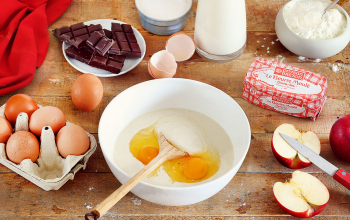 9. You can't cook with salted butter - FALSE
9. You can't cook with salted butter - FALSE
We agree that slightly salted butter is delicious on bread and toast for breakfast. It’s also great on radishes but also so much more! It does wonders for cakes and enhances the flavours of all your dishes. It is also recommended for deglazing your pan after frying meat. Salted butter can be used in all sorts of ways.
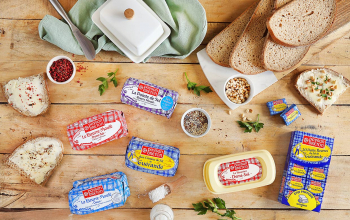 10. There is little choice between types of butter - FALSE
10. There is little choice between types of butter - FALSE
The best-known types of butter are unsalted and salted butter. Salt-lovers can also find many butters flavoured with sea salt or Guérande salt crystals. And did you know that at Paysan Breton, we have created a butter that you will find nowhere else: La Pointe de Sel. Somewhere between unsalted and salted butter, this butter is slightly salted, containing 25% less salt. Lovers of unsalted and salted butter alike will love this butter, where the delicious creamy flavour is subtly lifted by a tiny pinch of salt (just 1.4% salt, compared to the usual 2% in salted butter). This butter is ideal for amateurs of salted butter who wish to manage their salt consumption, those who prefer unsalted butter but are looking for something with a little more oomph, and for families who just can't decide between salted and unsalted. La Pointe de Sel butter ensures peace in the home! And if you're looking for an even more radical change, butter is ideal for use in various recipes, including fruit-flavoured butter or chocolate chip butter, herb butter, fish butter, etc. It offers almost infinite possibilities.
That’s given us an appetite, how about you? Check out our recipes with Paysan Breton butter, from breakfast to dinner including snacks:
Product of the month
Treat yourself!
Which of our quality products will you have in your kitchens this month?
Find out more about the rangeYou may also like
These articles
More reading? We'll give you more without moderation!
See all our articles
Our commitment
A fully transparent approach
For over 50 years, Paysan Breton has been committed to promoting the local economy in Brittany and Pays de la Loire, both in terms of dairy production and the products it manufactures. We advocate short ingredient lists and simple recipes, bringing authentic flavours to our customers' everyday lives. Our products are healthy, tasty and help protect the welfare of our farmers, their cows and the environment.
